Reviews
Sample Pages from [em]Pegeen[/em] by Hilda Van Stockum
Sample Pages from [em]Rare Catholic Stories and Poems[/em]
One fine moonlit night, during a late war in Europe, a lonely sentinel was pacing up and down his solitary beat when, suddenly, he heard a faint sound, like that of a stealthy footstep. It came from a clump of trees which formed the boundary to a portion of the land occupied by the camp.
He at once concluded that someone was trying to enter secretly, and so moved forward to the spot just as a man in uniform came into view.
Loud and clear rang the sentry's voice, as placing himself in front of the stranger he spoke the words usual at such a time -"Who goes there?" " A friend," was the feebly uttered answer. "Advance, friend, and give the countersign."
I ought to explain here to my young readers, that, in time of war, soldiers are every night placed at regular distances from each other, on all sides of the camp, to act as watchmen, and are forbidden under pain of death to permit anyone to pass them in any direction, unless sent by an officer.
To make sure of this, a word or two, or a sign, is chosen every night by the officers, which none know but their own men and the sentinels. This is called the countersign. Of course, anyone who does not know the countersign is considered to be an enemy.
When the sentinel said, " Advance! and give the countersign," the stranger replied, "I do not know it. If I did, I would not have tried to enter secretly; but do you not see by my dress that I am one of you. Three months I pined in the enemy's prison; yesterday, I escaped. Let me pass, for the love of God. I am ready to die with fatigue."
The sentry shuddered at the words, "for the love of God;" for he was a devout Catholic, and his heart ached to have to refuse this request. Besides, he believed the stranger was speaking the truth.
Still his orders were to shoot anyone who attempted to enter the camp without giving the countersign. "You have broke our rule," he said, sorrowfully. "You have broken it, and the punishment is death."
"I am not fit to die" said the other, in a hoarse voice. "I have offended God grievously in the past; I must have time to repent before death."
"I give you five minutes to pray." The young man sank upon his knees, raised his eyes to heaven, and made the sign of the cross. "You are saved!" cried the sentry, "because of our holy Faith. The Sign of the Cross is the countersign tonight."
Vocabulary
1. solitary
2. stealthily
3. feebly
4. pined
5. fatigue
6. shudder
7. hoarse
8. grievous
9. sentry
10. repent
Reading Comprehension Questions
1. Why did the sentry have to refuse the soldier's request even though he believed he was telling the truth?
2. What did the soldier mean when he said, "I am not fit to die"?
3. What saved the soldier?
Project
1. What sentry do you have posted at the entrance of your mind and heart? What is the countersign of your soul? Do you let in whatever feels good and pleases you, or what you know pleases God? Draw a picture of your Guardian Angel and on the back, list the ways he guards your soul. Ask your parents to help you.
Sample Pages from [em]Reading Comprehension: Stories of the Saints[/em] (Volume 1) by Elaine Woodfield
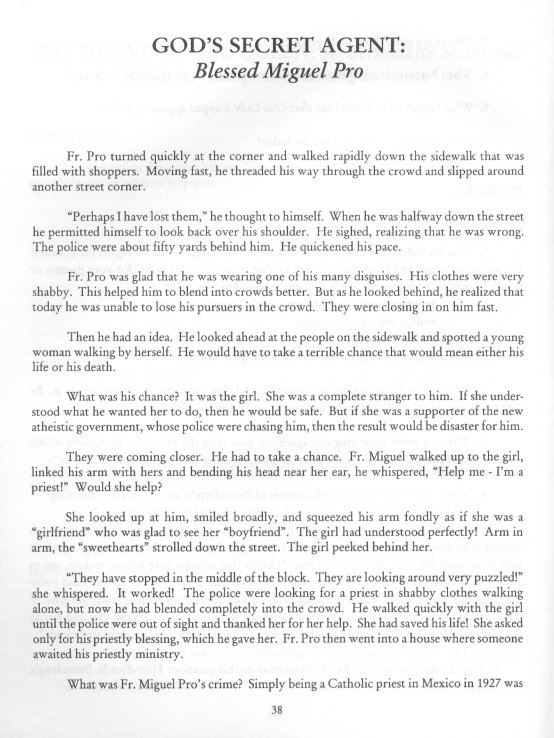
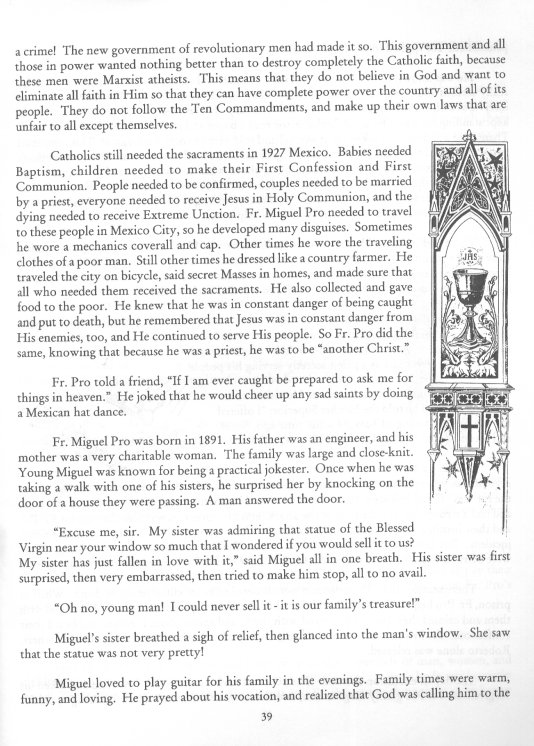
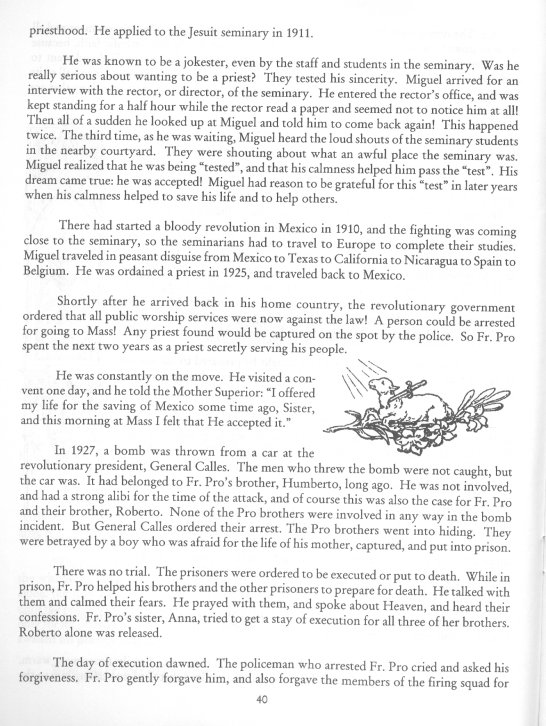
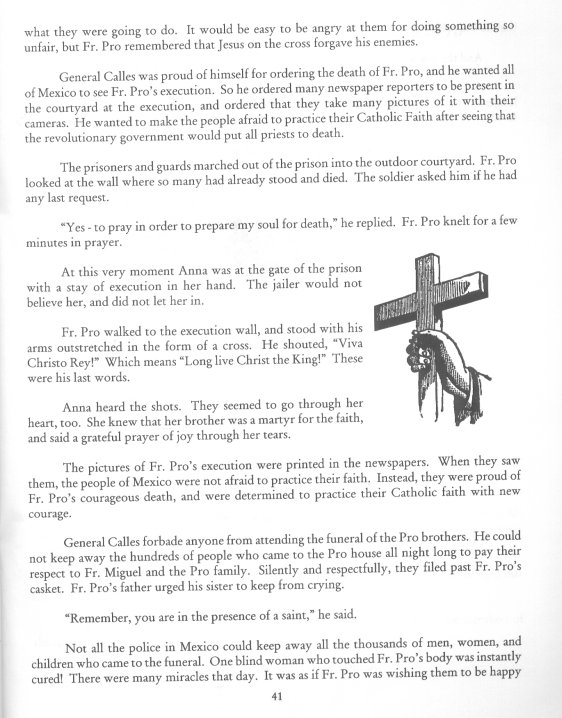
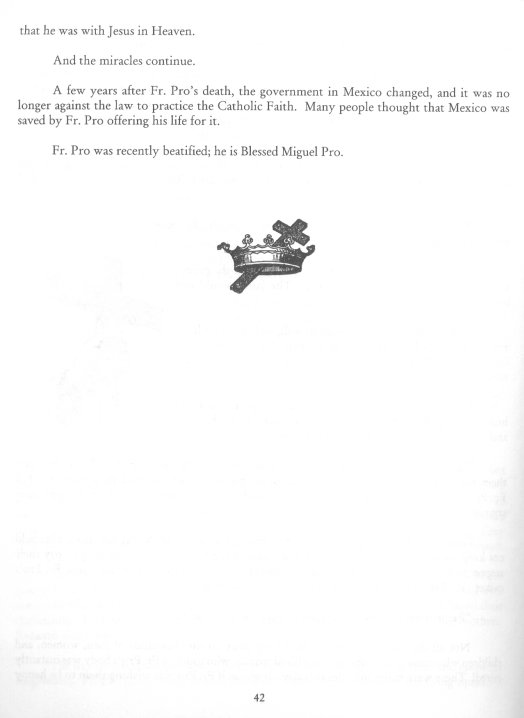
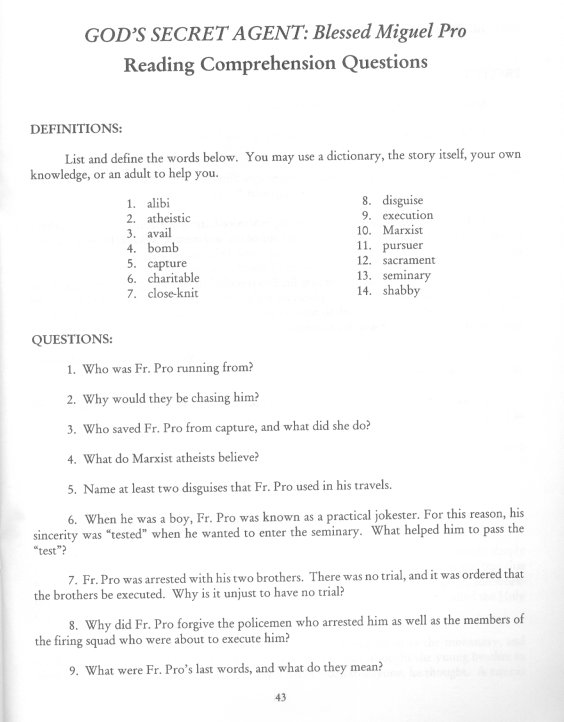
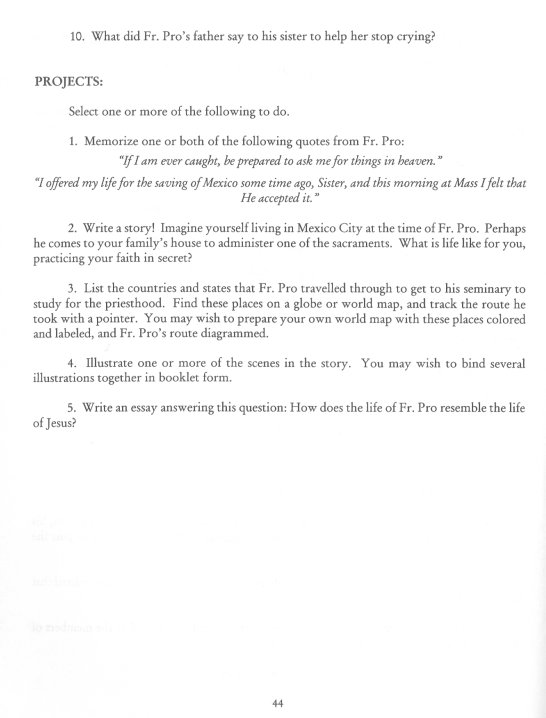
Sample Pages from [em]Reading Comprehension: Stories of the Saints[/em] (Volume 2) by Elaine Woodfield
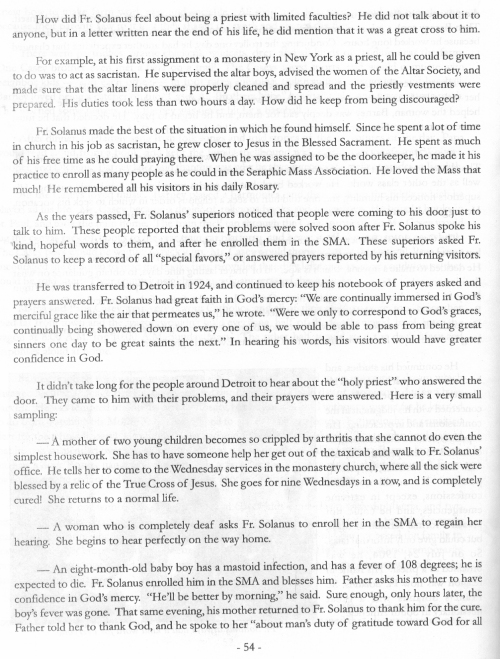
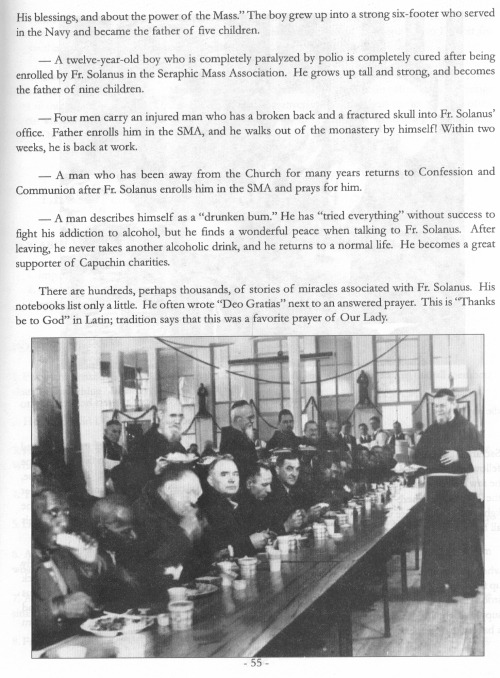
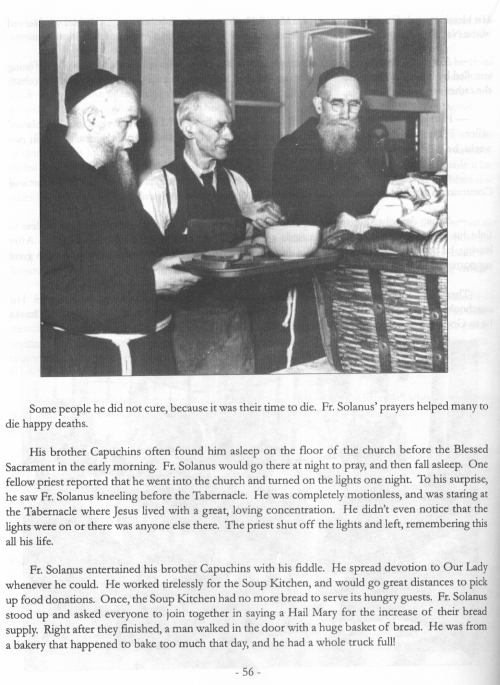
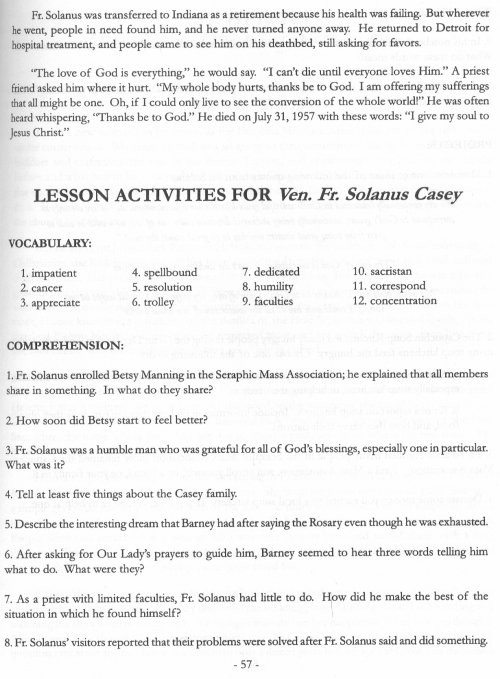
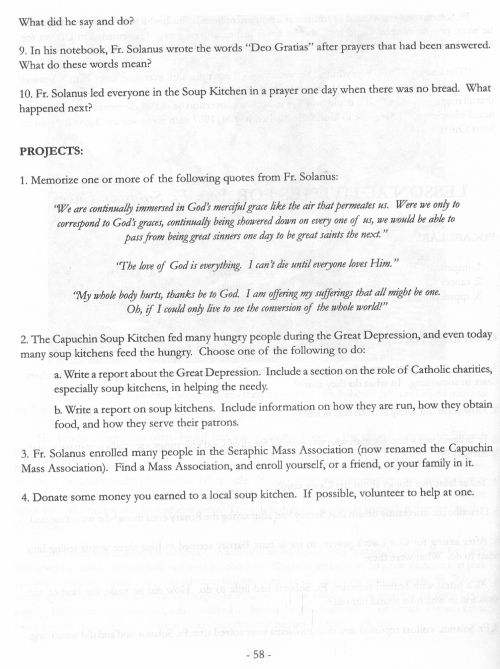
Sample Pages from [em]Reading Comprehension: Stories of the Saints[/em] (Volume 3) by Elaine Woodfield
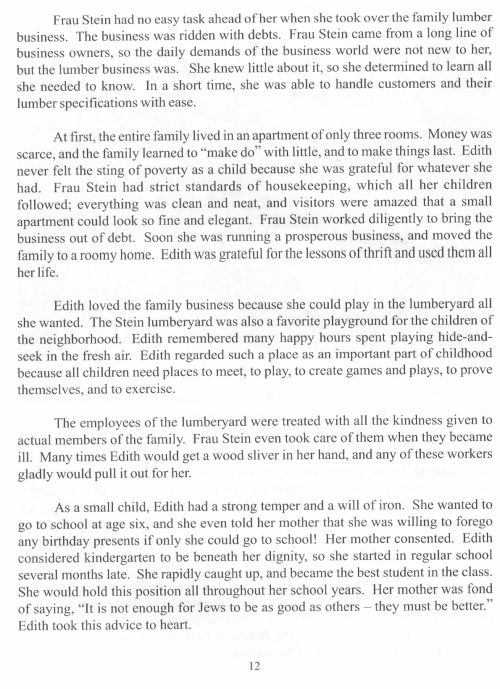
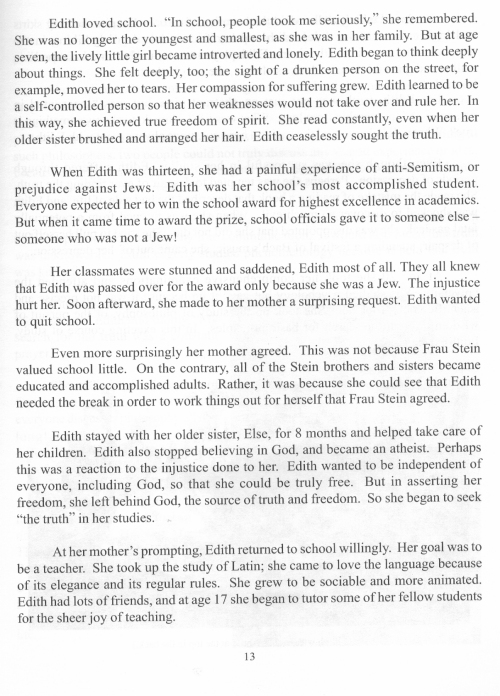
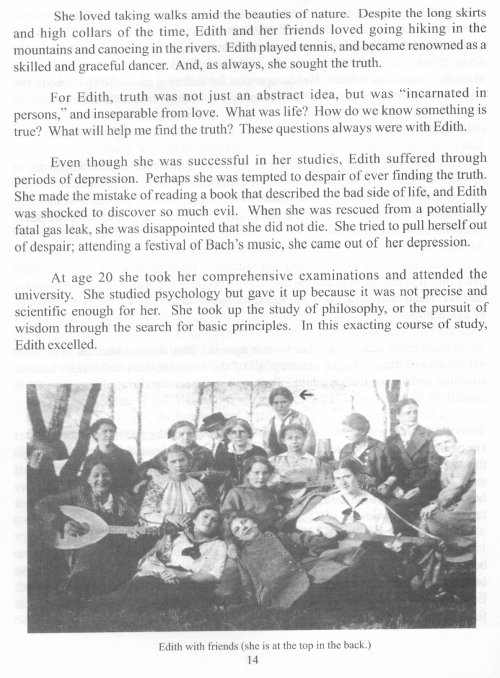
Sample Pages from [em]Reclaiming America's Children: Raising and Educating Morally Healthy Kids[/em] by Michelle Willis
PERMISSIVE PARENTING: ENHANCING IMPULSIVENESS, MINIMIZING CONSCIENCE
In study after study the child-rearing factors associated with aggression and delinquency are described in similar language. Several well-known studies have presented a picture from which two basic dimensions of parenting styles emerge: warm vs. cold and permissive vs. restrictive.
WARM PARENTAL STYLE: A warm parent is approving and supportive of the child, frequently employs praise as a reinforcement for good behavior and explains the reasons for rules.
COLD PARENTAL STYLE: A cold parent acts in the opposite manner, frequently displaying irritability, passiveness or indifference, and relying more on negative than on positive reinforcements.
RESTRICTIVE PARENTAL STYLE: The mother or father states clear rules, monitors behavior to insure that it conforms to those rules and reinforces compliance by the consistent and contingent use of reinforcement.
PERMISSIVE PARENTAL STYLE: Permissive parents fail to do these things though they imagine they do them because they are always yelling at the child, but inconsistent and ineffectual nattering is not a form of control that alters behavior in accordance with parental intentions.
In New Directions For Child Development (A Socioanalytic Theory of Moral Development), authors Hogan, Johnson and Elmer projected the general outcome of four parenting style combinations: warm-restrictive, warm-permissive, cold-restrictive, and cold-permissive.
WARM-RESTRICTlVE: These parents are highly supportive, loving, and often praise their children, but they are consistent about monitoring behavior and compliance with rules. They set and maintain clear, fair, and consistent boundaries. "Their children will value adult approval, readily internalize rules and be rule abiding."
WARM-PERMISSlVE: These parents are approving, loving and supportive, but inconsistent about monitoring behavior and compliance to rules. They often nag at or verbally reprimand the child, but seldom back up their words with consistent action. It is not uncommon for parents of this style to let the "little stuff' slide, and oftentimes they permit behaviors to continue which need correcting. "Their children will be self-confident and socially outgoing, but will frequently ignore or bend the rules; in everyday language they will be affable, but spoiled."
COLD-RESTRICTIVE: These parents display irritability and are often harsh to the child. They are insistent on the rules and sometimes inflict harsh punishment. This style is not uncommon in alcoholic or drug-abusing parents. "Their children will be anxious and sullen, but compliant: their anger may be turned inward on themselves."
COLD-PERMISSIVE: These parents are irritable, very often indifferent and inconsistent disciplinarians. They will sometimes react harshly over small infractions, while at other times they will pay little attention to the child or show little genuine concern. This style is also not uncommon in alcoholic or drug-abusing parents. Children from cold-permissive families are very much on their own in the world. These children "will be hostile and rule-defying, with a high probability of delinquency."
Recall what was said earlier regarding the shift in parenting advice, namely, that over the last several decades parents were advised to raise more self-expressive children. The advice shifted toward the style described above as warm-permissive. There is evidence that permissive parenting both enhances impulsiveness and minimizes the function of the conscience.
During the same period of time in which warm-permissive parenting was popularized, beginning with the late 1950s, there emerged also an expanding drug culture, a generation, many who are parents today. A significant number of these parents have retained their alcohol and drug habits. While the psychological "experts" called for warm-permissive parenting, the reality of the drug culture created a permissive style that was cold in nature. The former gave us children who are socially outgoing but who frequently ignore or bend the rules, while the latter produced children who tend to be sullen, hostile, or rule defying.
A famous study by D. J. West and D. P. Farrington published in 1973 entitled "Who Becomes Delinquent?" followed the careers of 411 boys chosen at random from a working class section of London. The study followed the boys from age eight to age seventeen. Although there were some questionable assumptions brought forth by the study, what many felt was indisputable in the London study was the impact of adverse child rearing practices.
" A particularly noticeable characteristic of the parents of many of the delinquents in the study was carelessness or laxness in matters of supervision. They were less concerned than other parents to watch over or to know about their children's doings, whereabouts and companions, and they failed to enforce or to formulate fixed rules about such things as punctuality, manners, bedtime, television viewing or tidying Up."
Although the constitutional make-up of children differs regarding their tendency and willingness to internalize rules and regulations, parental supervision and consistent monitoring of a child's behavior does affect, to some degree, whether or not and to what extent that child develops his own inner controls, or what is called an "operational conscience."
Since inner controls are absorbed by the child from the outer controls applied by a child's parents and by other authority figures, a child whose parents fail to set clear, fair, and consistent boundaries will show marked weakness in monitoring his own behavior. He is likely, not only to be more impulsive, but also to have less "bite of conscience" for his inappropriate actions.
It is innate for a child to believe that if the parent does not disapprove of certain behavior then that form of behavior is acceptable. Like the parents in the London study, permissive parents will probably provide less direct supervision and will either fail to formulate fixed rules or tend to overlook non-compliance to such things as manners, punctuality, bedtime, picking up after oneself, tone of voice, accountability for school performance, etc. They may yell at or nag the child and thus think they are good disciplinarians, but they seldom enforce compliance in a consistent manner. Since there is no actual consequence involved with repeated verbal reprimands, a child soon learns that his parent's scoldings mean very little, carry little weight and seldom, if ever, are followed by an actual consequence. He quickly learns to ignore them.
It works the same way in a classroom. Warm-restrictive teachers will encourage students through a genuine caring manner, but they will consistently monitor compliance regarding proper conduct. Warm-permissive teachers, on the other hand, will use repeated verbal warnings or reprimands and seldom take action until having overstepped their level of tolerance. Often permissive teachers yell at or nag students, thinking they are good disciplinarians, but just as in the home, inconsistent, ineffectual nattering in the classroom is not a form of control that alters behavior in a positive way.
Travis Hirschi, known best for his "social control theory," has concluded that parents can affect the behavior of their offspring in two ways: first, by instilling a desire for their approval, and second, by making that approval contingent on proper behavior. "Some parents, however much they want their children to value their approval, lack the inclination or the ability to make their rewards contingent on the child's displaying the behavior necessary to win that approval."
In a roundabout way, parents and teachers have been led to believe that it is wrong to inspire children to behave or perform in certain ways to win their approval. They have been told over and over that their love for a child should be "unconditional." Both humanistic psychology and "new age" thinking emphasize the importance of "unconditional love," but separating the person from his behavior is not easily accomplished. In everyday practice, the theory of "unconditional love" has often resulted in unconditional approval of behavior. Led by humanist psychologists, parents have come to believe that permissive parenting is loving parenting. They are afraid of damaging a child's self-esteem and equally fearful of hampering his natural self-expression. It has even been subtly suggested by mental health professionals that parents and teachers who strive to uphold standards for behavior have an unconscious, ulterior need for power and control.
While it is true that in an emotionally healthy family a child will not have to "win" the love of his parents, it does not necessarily mean he may not have to gain their approval by adhering to appropriate standards for behavior. As Dr. Samenow has stated:
"Being firm does not call for being any less loving, and it certainly does not call for harshness or abuse. Parents who equate leniency with love often have unceasing difficulty controlling their children. Life holds consequences for irresponsible and destructive behavior. What could be more loving than to help a child learn this early, when penalties for misbehavior are far less severe than they will be later in life."
It might be helpful for parents to remember that "moral choices are determined by moral conscience, which is shaped early in life and most profoundly by the family." That children should be free spirits is a mistaken idea. That imposing standards, obligations, or requirements deprives a child of his childhood is an idea that undermines the very fiber of a child's character. Of course we remember the horror stories of the past when children, robbed of their childhood, were forced into long hours of hard labor, but that is no longer the case. Today's children have been robbed of appropriate responsibility, their need for limits and boundaries denied them by permissive parents. "Failure to set limits may have disastrous results. These parents do not realize that a boy or a girl who receives little discipline may find it difficult to become self-disciplined."
Public classrooms are filled with unruly, undisciplined children. If, as a caring parent, you want your child to get the best education possible, you must send him to school prepared to learn, prepared to listen, to concentrate, and to behave appropriately. Teachers have to spend too much of their instructional time just trying to control student behavior. The energy it takes is tremendous, and the energy and time wasted because of misbehaving students is taking its toll on the effectiveness of education.
Today, parents tend to blame teachers when their children do not do well in school. This is, again, a result of the permissive parenting trend in which parents and authority figures look at forces outside the child as the cause for failure, rather than hold the child, himself, accountable for his poor performance. Teachers, while absorbing the blame, know how hard they work to educate children and how increasingly difficult that becomes as the students become increasingly unruly and undisciplined.
Parents must teach children to monitor their behavior, and they must not fail to hold their children accountable for misbehavior. Making excuses for a child teaches him to make excuses for himself. Placing blame on outside forces inhibits the development of an operational conscience. A child who does not develop an operational conscience when he is young will be better equipped to ignore the voice of conscience when it is convenient for him to do so later.
IN SUMMARY
While there are no guaranteed formulas for child rearing, and while each child comes into the world with his own unique set of qualities and his own disposition, certain parental factors do appear to hinder healthy morality while others enhance it. Parents and teachers alike can benefit by developing an overall style of discipline that is warm-restrictive in nature.
HELPFUL TIPS
I. Develop a warm-restrictive parenting/discipline style.
2. Remember that adult supervision and consistent monitoring of a child's behavior (different from nagging) are necessary factors in helping a child develop his own inner controls.
3. Keep in mind that repeated verbal reprimands and continual nagging do little to change behavior. Rather than utilizing repeated verbal warnings and threats, state expectations clearly, give one warning stating what the consequence will be if compliance does not follow, then calmly follow through with the consequence. Consistency of this caliber is amazingly effective, and it does not take many instances of this type of discipline to let a child know you mean what you say. (This works in the classroom, too.)
4. Consequences can be simple. They need not be harsh or abusive. It is the consistency in following through that carries the real clout.
5. "Being firm does not call for being any less loving and it certainly does not call for harshness or abuse."
6. Parents can affect the behavior of their children by instilling a desire for their approval and by making that approval contingent on proper behavior.
7. Parents and teachers should not mistake unconditional love for unconditional approval of behavior, nor must they be daunted by those who suggest that setting and upholding standards for behavior is the manifestation of some unhealthy, unconscious need for control and power.
8. Provide appropriate opportunities for a child to have some on-going responsibility.
9. Parents: Do not blame teachers when your child does not do well in school. If teachers were the problem, then all students would be doing poorly. That is certainly not the case. Teachers: Help parents to understand the importance of holding the child responsible for his poor performance.
10. Remember that making excuses for a child teachs him to conveniently excuse himself.
11. Do not inhibit the development of an operational conscience by placing blame on outside forces. Help your child to focus on himself and to make adjustments in his own behavior and attitude. Thinking that other people are the source of one's problems is a major characteristic of the antisocial person.
12. Above all, remember that a child who does not develop an operational conscience when he is young will find it easier to turn off the voice of conscience later .
13. Special Note: Parents and teachers of learning disabled students have an additional, and often, difficult task. They must find and maintain that acute balance between making allowances for a child's legitimate disability and reinforcing a child's sense of personal responsibility for his behavior and performance. As is the case with all children, learning disabled students must develop an operational conscience, and, like all children, when excuses are conveniently offered for them by others, they learn to conveniently excuse themselves.
Sample Pages from [em]Red Hugh, Prince of Donegal[/em] by Robert T. Reilly
"A TALE THAT IS not told dies." That’s what the old Irish storytellers like to say as they light their clay pipes from the turf fire and launch into a fanciful report on the legendary ghosts of their region or the "little folk" that do be bothering the lonesome traveler.
But sometimes their story is true—as this one is. And evenings when the embers are smoldering and the crickets scuttling among the warm ashes, the ancient Gaelic narrators hold their audiences spellbound with the tale of Red Hugh O’Donnell.
Red Hugh lived at a time when the first settlers from the Old World were eyeing the new continent, America. Shakespeare was writing his great plays and England defeated the Spanish Armada to become "Mistress of the Seas." During his lifetime, gunpowder was to become more prominent as a weapon of war and, less than twenty years after his death, the Pilgrim Fathers would land on Plymouth Rock.
His mother, Ineen Duive, was one of those remarkable warrior queens for which Ireland is famous. Her exploits serve to place her beside the fabled Maeve and Scota. But she had her gentle side, one that was in keeping with the true chivalric spirit of Ireland during those years.
On the Elizabethan maps, the gallant MacSweeney appeared as two crossed battle-axes, the symbol of his military might. His loyalty to his neighbor in Donegal is spoken of proudly by those who prize such virtues.
Every royal family had its own poet or shanachie and in Martin of Cloghan we shall find all of the features of the true bard. Contrary to current belief, the poet was not a weak and feminine man whose verses were his single attribute. He was often a fine warrior who rode into battle with his lord.
Villains there are, too, in this old tale. The English viceroys bore the brunt of the Irish hatred but behind all of their scheming rises the figure of Elizabeth, the powerful sovereign of that age.
Elizabeth never met Hugh Roe O’Donnell face to face but, in the events that closed both of their lives, they would learn much of each other. During the famous Nine Years’ War which follows the tale you are about to read, O’Donnell and his ally, O’Neill, defeated every army sent against them and turned back the invader on every front. Their defense of their country is one of the noblest chapters in this world’s short history.
But that’s another story—one that has a grown man for its hero. Our hero is yet a boy. The crickets have ceased their chirping and the shanachie has plucked a flaming straw from the warm turf. I believe he’s about to begin his tale.
Chapter One
IN THE FAR west of Donegal, where the waters of Lake Eske plunge headlong into the Atlantic, a solitary castle stood guard over a quiet September. Shaped like a sledge it was, with the massive head facing the stream and the long row of stone dwellings forming a handle that stretched to the opposite wall. Low-lying heather and tiny firs dotted the courtyard and repeated the triangular pattern which marked the gabled rooftops. The fortresslike head rose four stories high and towered above the rest of the buildings. Each corner was the base for a turret and the largest of these faced the ocean. There were few windows and these were but wide enough to accommodate the archers.
Surrounding the entire structure was a bawn, a large space enclosed by a stone wall. Within this lived the servants and retainers whose thatched huts ranged around the entire perimeter of the castle. Cattle were sheltered here at night and here, too, was the exercise and game area for the peasants and their lords. The bawn was quiet now. An old man could be seen carrying some turf into his hut and a little girl drove some sheep past the fortress and across the drawbridge to pasture land. A blacksmith’s hammer sounded rhythmically from his shop and a score of busy looms wove a melody about the smithy’s cadence.
From the ramparts of the castle the restless sentries swept the steep banks of the river and, behind them, armed warriors paced warily along the crest of the broad enclosure. Bowmen stood guard over the land approaches and a few small ship’s cannons pointed their iron muzzles toward the open sea. Powder and shot stood nearby and rack after rack of pikes and axes gleamed in the warm autumn sun. If the bawn displayed a people at peace, the fortress disclosed a people ready for war.
And well might the archers be alert and the bold infantrymen, or "gallowglasses," at their posts. For this was the year of our Lord, 1587, and the bright, broad shield of the O’Donnell looked down from the parapet above the moat.
On this stone shield a plump, brown wren roosted, cocked its tail, and then blinking beneath its white brows, sailed into the courtyard and peered boldly from its rock sill at the woman who lodged within.
Ineen Duive O’Donnell, queen of the northern clan, turned for a moment toward the small bird and smiled. Then, placing the palms of her hands against one another, she pressed her slender forefingers against her lips, musingly closed her eyes, and turned slowly back to the men that sat around the table.
Anyone observing her, as she faced the brehons, the Gaelic judges, would note first the deep, jet eyes and the ebon hair that settled easily on her white neck and shoulders. It was these features that had earned for her the title of "The Dark Lady of Donegal." She was a tall, intense woman whose proud carriage and regal presence informed the observer she was born to the throne. She was of the Scottish MacDonnells but had left her homeland years ago when the king of her Irish kinsmen had married her amid the swirl of the pipes and rollicking, kilted dancers. Now Hugh, her husband, was a bedridden invalid and to her fell the task of leadership in the stormy province.
"It is true," she addressed them, with her eyes half shut, "it is true that my son may not please all that meet him nor stir in them the conviction that he should be king. But king he shall be, nonetheless, and the time may be upon us for the crown to pass from his father."
A white-bearded ancient who propped his weary body against the heavy table spoke up for the judges. "Arrah, my lady, it is not that the prince is not well liked. By the saints, the reverse is true. The people love him. But he is young and has the faults of the young."
The queen lifted her head. "Hugh is fifteen," she replied. "My father ruled his clan at that age and I, myself, rode into battle when but a year older."
"Aye," another of the lawgivers interrupted, "it is not the age alone. If you will excuse an old man, we all fear the young prince is impatient and headstrong and not much given to the serious aspect of things."
The Dark Lady smiled patiently. "He is also courageous and clever. You have said so yourselves."
The first brehon made a searching little gesture with his hands and sucked in his breath before he spoke again.
"We know that the English Queen Elizabeth has promised to destroy us. Hour does not replace hour but we are made aware of her threat. Do you think young Hugh can manage her? Can he organize a defense as well as govern a province?"
"I shall be with him in his early years and his father has the wisdom to guide his footsteps."
The brehons exchanged a look of disbelief.
"His father is still the king," she reminded them sharply. Then softening, she added, "And there is the prophecy to consider."
The three judges nodded wearily and the youngest, who had not spoken, said, "The people here believe it, but a prophecy is not proof against Elizabeth’s fleet or her armies."
The queen seated herself at the head of the council table and rested her strong hands on the arms of the oak chair. Behind her, on the rippling arras, were emblazoned in gold the words, "O’Donnell Abu," "O’Donnell to Victory," the battle cry of the clan.
"It was first proclaimed by judges like yourselves," she said at last, "and the legend has swept like a flame across this green land until every hut and every castle wills that it shall come to pass." Her brow furrowed as if she looked past the silent elders, past the dim hanging lamp, and beyond the dark paneled chamber that enclosed the present. "It was said," she continued, "that when Hugh succeeded Hugh, then should Ireland be free. And now, in this generation, does my son Red Hugh sit at the knee of his father, the old Hugh O’Donnell, my husband. When he shall leave that place and seat himself on that timeless throne, then shall the words of ages past be redeemed. We shall see it happen."
There was a long silence in the room, until one of the judges began to speak again.
"My Queen," he said gravely, "do you not think that Elizabeth, too, knows the prophecy? Do you imagine for one whisper of a moment that, cunning as she is, she will see this transpire without a battle?"
Ineen rose, her long garments trailing behind her, and walked again to the window where she allowed the wren to peck at her fingers.
"Och, she is cunning, right enough," she said, smiling, "and schooled in the arts of deceit and intrigue. They say she wears a red wig and has many lovers who flatter her and call her beautiful. Her galleons choke the channel and her warriors mock the challenge of Spain. And yet does she fear me—for I have a son!"
The impertinent little bird scolded the queen for her laughing pride and the old brehons took her bright reverie as a signal for dismissal. The wren wheeled about the fall sky inventing idle melodies. Their complaints expressed in noiseless gestures, the lawgivers drifted back through the cold, dim halls of the castle.
Sample Pages from [em]Saint Athanasius[/em] by F.A. Forbes
A FORESHADOWING
THE Patriarch of Alexandria, Egypt was expecting company. He stood at the window of his palace looking down the long road, that at the first sign of his guests' arrival he might go forth and welcome them. Before him, like a white pearl in the blue waters of the Mediterranean, lay the city of Alexandria - "the beautiful," as men loved to call it. Across the harbor the marble tower of the great lighthouse soared up into the clear Eastern sky, white as the white cliffs of the Island of Pharos from which it sprang. It was noonday, and the sunshine lay like a veil of gold over all.
The Patriarch's thoughts were wandering in the past. He had been celebrating the anniversary of his holy predecessor Peter, the previous Bishop, who had won the crown of martyrdom during the terrible persecution of the Christians not so many years before. Several of the clergy present had come from afar to assist at the festival, and these were to be his expected guests.
The time of suffering was past and over, and yet it seemed to Alexander as if it had all happened yesterday and might happen again tomorrow. There stood the great palace of the Caesars, where the pagan emperor had sat in judgment upon the lambs of Christ's flock; there the famous temple of Serapis, where the Christians had been dragged to offer incense to the gods; there the amphitheater where they had been torn to pieces by beasts and slain with the sword for confessing the Name of Christ. And all through those , dark days, firm and steadfast as the lighthouse on the cliffs of Pharos, had stood the Patriarch Peter, a tower of strength and comfort to his persecuted children.
A hundred Bishops and more had looked to him as their head, for the See of Alexandria in the East was second only to that of Rome in the West, and the burden of responsibility was heavy. But, thanks to the example of its chief, the Church in Egypt had borne the trial bravely, and if some had quailed before the torture and the rack and had fallen away, by far the greater number had been true. Even the unheroic souls, who had loved their lives better than their God, had not been lost beyond hope, for they had come back during the lulls in the storm, begging to be absolved from their sin. And Peter, mindful of his Master's words that he should not quench the smoking flax nor break the bruised reed, received them back, after they had done penance, into the fold of Christ with mercy and compassion.
There were some who had not scrupled to protest against such mercy. "Were these apostates," cried Meletius, Bishop of Lykopolis, "to be made equal to those who had borne the burden and the heat of the day?" And he had rebelled against the decision of the Patriarch and made a schism in the Church. Even the martyrdom of the holy Peter had not brought him back to his allegiance: the Meletians were rebels still, to the crying scandal of Christians and pagans alike.
They were a hard people to govern, these Alexandrians-subtle, passionate and unstable, ready to follow any preacher of novelties. Alexander half envied Peter his martyr's crown as he stood musing over the past.
What was delaying his guests? he wondered, as he looked down the long road, where there was as yet no sign of them.
On the shore, at a little distance, a group of boys were playing, their bare legs and white tunics flashing hither and thither as they ran. One of them, a tall slim lad, whose aureole of ruddy hair seemed to catch every wandering sunbeam, was evidently directing the game, for all seemed to look to him for orders. "A leader of men," smiled the Patriarch to himself, as a vigorous wave of the boy's hand brought all his companions round him.
They were building some kind of a platform now, on to which he of the ruddy locks was promptly hoisted, while the others appeared to be forming a procession.
"A church ceremony," murmured the Patriarch to himself, remembering his own boyhood days. Presently a little boy advanced solemnly and presented some kind of a vessel to the youthful bishop, who, with a magnificent gesture, beckoned to the procession to approach. Then, as the foremost boy advanced and knelt at his feet, he raised the vessel and poured some of its contents over his head.
"The baptism of the catechumens!" exclaimed the Patriarch; "but this looks a good deal too much like earnest!"
Hastily calling a servant, he bade him go down to the shore and bring up the band of boys who were playing there. Summoned thus hastily to appear before authority, they approached with some uneasiness, and there was a certain amount of scuffling among them which resulted in the appearance of the would-be bishop in the forefront of the group - and where should a bishop be if not at the head of his flock?
"What were you doing down there on the shore?" asked the Patriarch.
The boy's clear eyes looked at him with interest, but without a vestige of fear.
"We were playing," he said. "It was the baptism of the catechumens. I was the bishop, and they" - pointing to his companions - "were the catechumens."
"Are you a Christian?" asked Alexander.
"Yes," answered the boy proudly.
"And these?"
"Catechumens."
"What did you do?"
"I poured the water on them and said the words."
"What words?"
The boy repeated the formula in perfect Greek.
"Did you pour the water as you said the words?"
"Yes."
The Patriarch's face was troubled. "It is a dangerous game to play at," he said. "What would you say if I told you that you had really baptized them?"
The boy looked at him in amazement. "But I am not a bishop," he said.
The Patriarch could not help smiling. "Although the bishop usually does baptize the catechumens," he said, "it is not necessary that it should be a bishop, not even necessary that it should be a priest."
The boy-bishop looked grave, his companions frightened, the Patriarch thoughtful.
"What is your name?" he asked suddenly, laying his hand on the ruddy locks.
"Athanasius," answered the boy.
"What would you like to be?" he asked.
"A priest," was the prompt answer.
"A bishop perhaps?" asked Alexander with a smile; "you think it is an easy and a glorious life?"
The boy's eyes looked straight into the Patriarch's.
"The blessed Peter was a martyr," he answered.
"You need much learning to be a priest."
"I love learning," said the boy.
Alexander noted the broad, intelligent brow, the keen eyes and the clear-cut face before him. His heart went out to this frank and fearless lad who loved the martyrs.
"Come to me this evening, and we will talk of this," he said, for his guests were at last to be seen approaching, and his duty lay with them.
That evening the boy and the Patriarch had much to say to each other as they walked under the palm trees in the garden of the episcopal palace. Alexander learned how Athanasius had been brought up in the Christian Faith under the shadow of the great persecution, among those who counted it the highest honor to shed their blood for Christ. He had been well taught in the famous Greek schools of Alexandria and was full of enthusiasm for the great Greek philosophers and poets. Strong of will, noble of heart and keen of intellect, the boy was born to something great - of that the Patriarch felt assured. The Church had need of such men in these troublous times, when the dangers of heresy had succeeded to those of persecution.
Alexander at once resolved to take Athanasius into his household and to bring him up as his own son, an inspiration for which he was often to thank God in the years to come. The boy soon grew to love the gentle and holy Patriarch, who could act with such strength and decision when it was needful for the good of the Church. He was constantly in touch with men of every rank and country, for Alexandria was a city where people of all nations and of all creeds met. Pagans, Jews and Christians lived side by side in their various quarters; there even existed a set of philosophers who tried to make a religion for themselves out of an amalgamation of several others.
Athanasius was still very young when he began to act as secretary to the Patriarch, accompanying him on all his journeys throughout his vast diocese; and he himself tells us how he stayed , for a time among the monks in the desert of Egypt and how his young soul was set on fire by the holiness of their lives.
Neither science nor logic nor philosophy, offered any difficulty to the brilliant young scholar, whose knowledge of Scripture and of theology was to astonish the men of his time. Alexander himself as he grew older leaned more and more on Athanasius, consulting him, young as he was, on the most important matters.
So the years rolled on, and the boy grew into manhood, "gentle and strong," as we are told by one who knew him, "high in prowess, humble in spirit, full of sympathy, angelic in mind and face." That he would make his mark on the world of his time, few who knew him doubted; but of the dauntless soldier-spirit that slumbered behind that gentle mien, of the steadfast will that no human power could shake, they knew but little. God's moment had not yet come.
Sample Pages from [em]Saint Therese and the Roses[/em] by Helen Walker Homan
French Lace and Fine Jewels
Little Therese sat on the floor at her mother's feet, watching the bright needle as it flew through the cloud of fine lace her mother was making. It was a winter day in the year 1875.
The room was warm and cozy, but outside it was snowing. Therese could see the big soft flakes falling against the window where her mother's chair had been drawn to catch the fading light. Therese was not yet three years old, but she noticed everything.
She was thinking now that the snowflakes outside looked like the lovely white lace growing under her mother's quick fingers. Later she would learn that her mother was the finest maker of lace in the city of Alencon - and that Alencon, France, was the place where the finest lace in all the world was made.
Crawling closer, she pulled herself up by her mother's skirts and toddled to the window. She put her small nose against the pane, wishing with all her heart that she could catch the snowflakes as they fell. Snow did not come often to Alencon, and when it did, it delighted the children.
"Come back, little one", said her mother. "Come back, and sit here with me. The window is cold. Soon your sisters will return, and Celine will play a fine game with you.
But little Therese stayed at the window, and her mother had to rise and carry the small girl back to the cushion at her feet. Therese did not mind, for really her favorite place was on the carpet of the cozy sitting room. It was such a lovely carpet with bright red and pink roses woven on it. Now she stretched down a tiny finger and began to trace the outline of one of the big red roses.
"Rose," she said and smiled up at her mother.
"Yes, dearest," replied her mother, bending to stroke the soft golden curls that crowned the small head. "It is a rose. And when sumemr comes, you will see many like it growing in the garden. Only they will be much lovelier, for they will have been made by the good God himself."
"The good God", repeated Therese. But she said it in French, which has a softer sound. "Le bon Dieu", she said.
Her mother was thinking how prettily she smiled and how large and blue were her eyes.
Just then they heard the outer door open, and the happy voices of Therese's older sisters filled the hall. They had been out for a romp in the snow. In they came, with faces glowing and eyes dancing. Throwing off their wet coats to dry near the stove, they all began talking at once in their rapid French. Their mother thought they sounded like a flock of young birds, chirping among the apple blossoms that bloomed every springtime against the old stone wall in the garden.
Marie, the oldest, with her big, brown eyes, was as tall as her mother. Because she was almost sixteen and helped greatly with the housekeeping, all the others looked up to her. Little Therese, the baby of the family, held up her arms to Marie for a hug and a kiss.
Therese had four sisters. After Marie came Pauline, who was fourteen, but she was away now at boarding school. Next came Leonie, who was twelve; and then Celine, who was six. With Therese, this made five children, four of whom were now gathered about their mother in the warm room.
When Marie had hugged the baby, she reached in her pocket, and to Therese's delight, gave her a small piece of chocolate. Then Marie put her arm about her mother's shoulder and bent down to look at the foam of white lace in her lap.
"It's beautiful, Mother!" exclaimed Marie. "The loveliest you ever made! And who is to be lucky enough to own it?"
"The countess de Montfort ordered it for her daughter's wedding dress. But you do not think the thread is too thin, do you, Marie?" she asked worriedly, bending her head to one side as she held the lace up to the light.
"It's perfect", said Marie. "The bride will look like an angel when she wears it."
But as Marie smiled down into her mother's face, she was troubled. It was a lovely face with its straight, slender nose and its large black eyes full of liveliness. But Marie could see now that her mother looked very tired. Once again she was working too hard.
"Why don't you put your work aside and take a little rest before Father comes home?" Marie asked.
"No, no, dear. I am not tired", replied her mother. "And I have only a little more to finish."
"Well then, there's no excuse for me not to be at work", said Marie gaily. "It's almost time for supper, and Louise will be looking for me in the kitchen." And off she flew.
Louise was the maid who took care of the Martin family. Soon Marie was busy helping her fix the evening meal.
Six-year-old Celine had dropped on the floor beside Therese, who was laughing happily as her sister pretended she was a little dog on all fours, barking and snapping at the chocolate. But the baby held on to it tightly. Everyone in the room was smiling except Leonie.
"Mother," she was saying. "I want to go away to boarding school, like Pauline."
"So you shall, dear, one day," answered her mother.
"But I want to go now," Leonie insisted.
"Why, you are only twelve, Leonie. Pauline, you know, is fourteen."
"But I'm tall for my age, and anyway, I'm tired of it around here."
"Hush, Leonie," said her mother. "You must not let your father hear you say such things. He would be very angry. And he will be home any moment now."
"Father, Father, Father - that's all I hear around this house!" And swooping up her coat, Leonie dashed angrily from the room.
Madame Martin sighed as she laid aside her needle. God had blessed her with five beautiful children. To be sure, had all her children lived, there would have been nine. Yet God was very good to have spared her the five. But why was it that, of these five, there was only one who gave her any trouble? Leonie, Leonie - she must try to help her overcome angry, unhappy moods. Perhaps the reason she was full of moods and hard to please was that she had been quite ill and had almost died when she was a little girl. Perhaps that was why she was not as happy as the others.
When Louis Martin came home, the onion soup was steaming from the heavy kettle that hung in the great open fireplace. Therese heard him at the front door, stamping the snow from hsi feet. Scrambling from her cushion, she toddled as fast as she could to meet him. Her handsoime father swung the child to his shoulder and rubbed his cold cheek against hers. She had her arms tight about his neck, and he went dancing into the sitting room, singing at the same time, "Make way for the Queen! Make way for the Queen!"
That was his special name for Therese; and when he was looking for her, he would always ask the others, "Where is my Little Queen?"
As for Therese, she was never happier than when in her father's arms.
"Leonie, Leonie," called her mother, "your father is home. It's time to prepare Celine and the baby for supper."
As Louis Martin set Therese down and took off his coat, Leonie came slowly down the stairs, thinking, "IF I were at boarding school, I would not have this tiresome task to do every evening." But almost at once she was ashamed of herself for this thought. And when she entered she even managed a smile for her father.
"That's my good Leonie", he said as he kissed her.
Then Leonie felt more ashamed of her bad temper and what it had made her say about him.
When they were alone, Madame Martin asked her husband, "Well, Louis dear, did you have any luck?"
"Yes, indeed, my dear Zelie", he exclaimed as he warmed his feet against the stove. "I showed some pieces of your lace to the head of the great firm of Laurent and Company - the largest in Paris. For the next year, he will buy all we can provide."
"Oh, Louis! How wonderful!" exclaimed Madame Martin. "You are truly very clever at business!"
"Nonsense", replied her husband. "It's only because you are such ana rtist and work so faithfully that the good God has helped us get this order. But now, my dear, you must hire more helpers so that you will be bale to make enough lace for our new customer."
The making of Madame Martin's beautiful lace was not simply. Women had to study and practice for years before they could make it. Madame Martin hired other women to stitch the patterns. But, she herself always did the hardest task; she wove the fine strips together.
"Yes, we shall need more help now that we have this large order. We must double the prayers to our Lady and ask her to keep on blessing the work."
"Do not fear. She never fails us," replied her husband. "It was the same when I had my jewelry shop. Ah, how often did our Lady help me!"
"Your charming shop - and the beautiful jewelry you made with your own hands! You are the artist, not I. Oh, Louis, how I hated to see you give up all that!"
"My dear, your lace brings me as much joy as the other work did. Besides, you were killing yourself with overwork. How could anyone take care of a business, a home, and five children besides? IT was high time that I gave up the shop and turned to helping such a hard-working wife."
Madame Martin smiled gratefully at her husband. "It still troubles me when I think how much you must miss those beautiful jewels."
"I have six beautiful jewels right here in my own home", said Louis Martin, jumping from his chair and lightly kissing her cheek. "And you are the most beautiful of all!"
"Ah, Louis, I shall become vain", laughed Zelie Martin. "Come, let us go to supper."
Therese, holding on to Leonie's hand, now came toddling in with a fresh blue ribbon, the color of her eyes, tied to her tiny curls. Marie was calling them all to supper. When they were seated about the table, her father praised the good onion soup, whose perfume filled the room, and the vegetables Marie and Louise had prepared.
Louise had come toh the Martin family form a French farm. She was almost as wide as she was short, but very strong and active. Now, as she served the meal, she joined in the suppertime talk as though she were one of the family. She laughed loudly at all Louis Martin's jokes, helped Madame Martin to feed Therese, who sat on a high chair at her mother's side, and even gave Celine a quick slap on the hand when she caught her eating too quickly.
When supper was over, Madame Martin herself carried the sleepy Therese up to the bedroom she shared with Celine. While all helped to take care of the baby during the day, it was her mother who always put her to bed at night. When she had undressed her, she said, "Now, dear, it is time to kneel down and say your prayers."
The little girl knelt at her mother's knee and folded her small hands. Already she could say the Hail Mary without any help and the Our Father with very little help. Now she turned her head toward the small statue of the Infant Jesus her mother had given her. She had a special prayer for him, which went like this: "Dear little Jesus, bless my mother and father, my sisters, Louise, and little Therese, Amen."
It always seemed to her that the Chidl Jesus was listening and promising her that he would bless everyone. The statue showed him dressed as a little king with a golden crown. It was a copy of the famous statue of the Infant of Prague, her mother explained. Therese loved it, for in one hand the Infant Jesus held out a ball. She liked to think that at any moment he would toss it to her, and she could toss it back to him, and they would laugh and play together. When she was a little older she was surprised to learn that what the Child Jesus held was not supposed to be a ball after all - but instead the big round world.
When Madame Martin had tucked Therese into bed and kissed her good-night, she blew out the candle and went downstairs to join the others. Celine was also on her way to bed. Then Louis Martin went to the high chest and drew out the checkerboard.
"Who would like a game" he asked.
But his wife said, "Wait a moment, Louis. First I want to read you the letter that came today from Pauline You will be happy to learn how well she is doing in the convent at Le Mans!"
"Good!" replied her husband, settling himself in his comfortable chair.
Zelie Martin took the letter from her pocket, handling it as though it were a treasure. Marie hung eagerly over her mother's shoulder to see every line of it for herself. But Leonie started to leave the room. Her father looked at her in surprise.
"Are you not staying to hear your sister's letter?" he asked.
Leonie stopped at the door and hunger her head, saying nothing.
"Well?" demanded her father sharply.
She looked up angrily. "No!" she snapped. "I'm going to the kitchen to see Louise."
Her father said sternly, "You will remain here until your mother has read the letter aloud. Sit down!"
Leonie sat. But something deep inside hurt. It was as though some small creature inside her were crying.
Her mother gave her a quick smile. Then she began to read from the letter.
"Dearest Mother and Father, I miss you so much. This year the convent seems lonely without Marie. But I look forward to the spring when I shall be with you all again for the holidays. Then you will see how I have grown and how well I shall be able to help Marie with the housekeeping! Is the baby as pretty as when I last saw her? Mother dear, I hope you are not working too hard. You and Father will be glad to hear that my marks were quite good last month. I came out next to the highest. But I can't wait until I see you again! Will you meet me at the station? Already I can imagine myself on the train. Please give my love to my sisters, and give the baby a special hug from me. I close with love and respect to you, my dear parents. Your Pauline.
"P.S. Aunt Elise sends her love and says to tell you that she is proud of me (for my marks). PRay that I shall do as well this month."
Autn Elise was Madame Martin's own sister, who was now a nun in the Visitation Convent at Le Mans, Pauline's school.
"You may go now, Leonie," said her father gravely, and without a word Leonie was off for the kitchen.
As she folded the letter, Zelie Martin smiled happily. "Isn't it wonderful, Louis, that our Pauline is doing so well?"
"Indeed, my dear, very wonderful." Then he added with a twinkle in his eye, "But after all, she should do well. Of all the children, she is the one who is most like her mother!"
"And who am I like?" asked Marie, as she settled herself at the checkerboard with her father.
He looked her up and down teasingly, pretending that he was unable to decide.
"Why, Marie!" exclaimed her mother. "Don't you know? You are just like your father. But you must try to be as good as he is. See how often he goes to church--"
"And fishing," added Marie with a twinkle.
Then they all laughed, and Louis Martin the loudest of all.
"Just for that, I will beat you at checkers, young lady", he said as he began to set out the pieces. His love for fishing was one of the family jokes.
The next day was Sunday, and all, even Therese, went to early Mass at the beautiful old Church of Notre Dame. It was amzing how wel Therese could walk all the way there. She was quick at learning things, thought her father - much quicker than any of the others had been at her age.
On Sundays when the weather was fine, the family would take a walk in the afternoon. These walks always ended again at the church for the evening service of Vespers. Therese loved the stained glass windows of Notre Dame. Their lovely colors were soft and glowing, and the light of the setting sun came through them, casting a rainbow of colors upon one side of the white marble altar. She delighted too in the flickering candles and the music that came from the great organ. She would sit very still, very happy, while the service lasted. Now more and more she looked forward to Sundays...
Some months later, in the early spring, the family set out as usual on their Sunday afternoon walk. Therese, dancing along at her father's side, was in her best blue dress and blue coat. Madame Martin looked at her daughters with pleasure. She was careful about their clothing, and this afternoon they did indeed look very pretty. It was a lovely sunny day, without a cloud in the sky. But they had not gone very far before a high wind arose. Suddenly dark clouds blew across the face of the sun.
"We shall have rain, I fear", said Louis Martin.
A few moments later it came - at first slowly, and then as the wind rose higher, in a great downpour. Luckily, they were near the home of louis Maritn's mother. They hastened to her door. She was delighted to see them, and she helped the children put their wet coats near the fire to dry. Then she started fixing cups of steaming hot chocolate.
Louis Martin stood at the window, drawing aside the lace curtin to gaze out at the weather. "The rian may end as quickly as it began, and I believe we shall be able to go on to Vespers, after all."
But her mother looked at Therese and was uneasy. It would be better not ot keep the little one out in such uncertain weather; much better to send her home. Once could not tell how the weather would be after Vepsers, and she did not wish to risk an illness. A sudden thought struck her that this would be a good way to show Leonie how much the family trusted her and that she was both needed and loved.
"Leonie dear," she said, "I don't want to keep the baby out in this weather. I would like you to take her home now. There is a break in the storm. Perhaps if you hurry you will get home before the next downpour."
A smile lit up Leonie's face. It was an errand of trust. Her mother had not asked Marie, as she usually did, but had asked her! She made up her mind to take every care to fulfill the trust perfectly. "Of course, Mother", she said.
But when Leonie tried to get Therese into her coat, the child cried loudly. She seemed to know that she was being taken home and not to her beloved church, Notre Dame. As Leonie tugged her through the wet streets, Therese kept hanging back and crying. They arrived at the house breathless, and Leonie was opening the door just as the second downpour burst upon them. The skies were now black; it was as dark as midnight. As Leonie pushed open the door, Louise came running out from the kitchen.
"Thak heaven, some has come! The kitchen window is stuck fast. I can't close it alone, and the rain is pouring in, all over everything! Come quickly!"
Not stopping to shut the door, Leonie ran to help her. It took quite a while to close the window. When Leonie got back to the hall, Therese was gone. She ran into the sitting room, looking for her. It was empty. Then she ran upstairs and looked in all the bedrooms. Therese was no Therese anywhere. She became very frightened. Running down the stairs, she called out to Louise, "The baby! She's gone!"
Then she noticed the open door and went cold with fright. With beating hearts, Louise and Leonie peered out into the darkness and the rain. But there was no sign of Therese. Only torrents and torrents of rain - and darkness. Leonie sat down ont he stairs and began to cry. "Oh, Louise, they trusted her to me, and I've lost her! We may never find her. Father will be very angry. He will - he may - he will never forgive me!"
